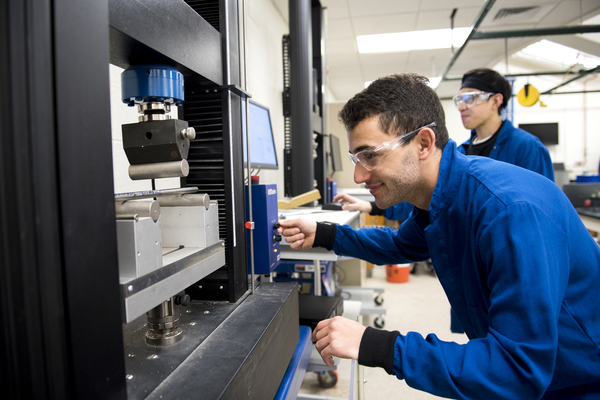Undergraduate Studies
A broad-based, interdisciplinary and experiential engineering curriculum that offers a rigorous yet flexible education.
Programs to prepare the next generation of engineers. Successful graduates in civil engineering and environmental engineering will have the ability to create, invent, and lead a new generation of professionals and will be able to address key challenges to protect the natural environment and to design and create the built environment for community living, industry, and society development.
Three overarching themes emphasized in our programs, including environmental health, civil infrastructure security, and sustainable resource engineering. These themes are aligned with the department’s premier strengths in simulation (both computational and experimental), smart sensing, data and network science, and urban informatics and are incorporated in the undergraduate programs we offer.
Electives for program flexibility. Our programs have been designed with a set of electives that permit students to explore or acquire further depth in other fields of interest. Students can use these electives to earn a minor in environmental chemistry, architectural engineering, business, architectural history, music, computer science, or any number of other fields.
In the civil engineering field, our programs encompass several disciplines, including transportation and infrastructure planning and engineering; structural engineering; geotechnical engineering; water resources, environmental, and coastal systems engineering; and construction management.
In the environmental engineering field, our programs include developing sustainable resource engineering solutions to environmental health needs with an understanding of institutional and legal frameworks, all related to interconnected challenges in water, energy, air pollution, and waste management, to protect and provide a better quality of life to the human race.

Student organization chapters that are strong and vibrant.
- Our Engineers without Borders chapter (NU-EWB) is recognized as one of the premier chapters in the country, with current ongoing projects in Panama, Uganda, and Guatemala.
- American Society of Civil Engineers (NUASCE) has been recognized numerous times over the years as the most outstanding chapter in the country.
- Chi Epsilon, the Institute of Transportation Engineers, the Society of Women Engineers, and others provide a range of opportunities such as community service projects that embody the true spirit of our profession; national competitions that enable students to learn new skills and meet colleagues from around the country; and weekly seminars that bring top engineers to campus to interact directly with students
More Information
Undergraduate education at Northeastern’s College of Engineering offers ongoing support and resources as well as innovative programs such as our world-renowned cooperative education program and opportunities for entrepreneurship and business.
